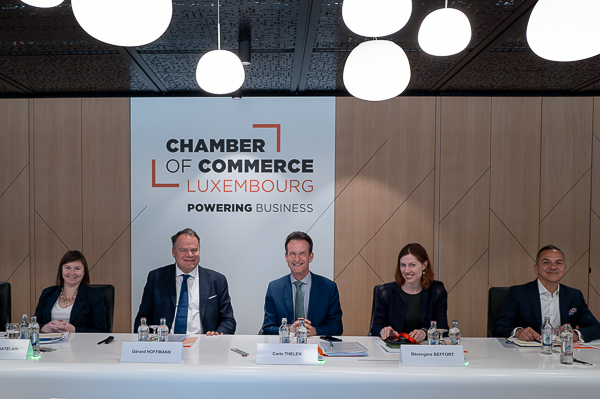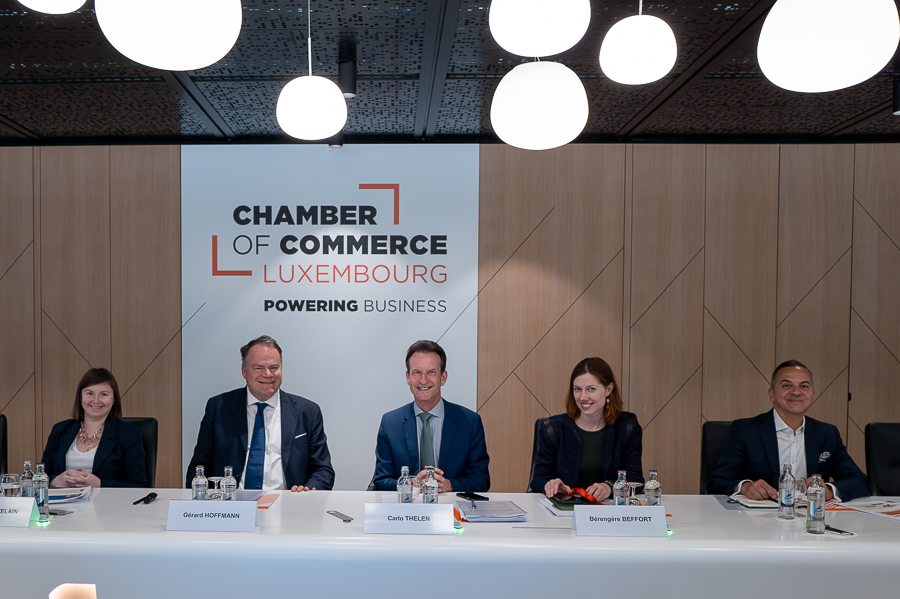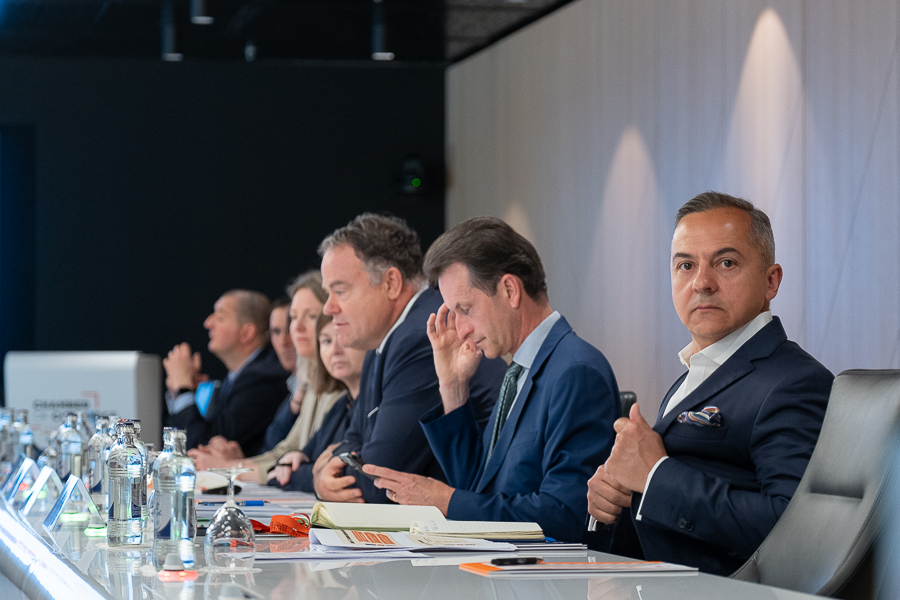 (L-R) Christel Chatelain, Director Economic Affairs; Gérard Hoffmann, president of the AI Working Group; Carlo Thelen, Director General of the Chamber of Commerce; Bérengère Beffort, Head of Public Relations, Marketing & Communication; nc;
Credit: Ali Sahib, Chronicle.lu
(L-R) Christel Chatelain, Director Economic Affairs; Gérard Hoffmann, president of the AI Working Group; Carlo Thelen, Director General of the Chamber of Commerce; Bérengère Beffort, Head of Public Relations, Marketing & Communication; nc;
Credit: Ali Sahib, Chronicle.lu
On Tuesday 20 May 2025, members of the Luxembourg Chamber of Commerce hosted a press conference where they presented its “LuxAIhub” strategy report, outlining 30 recommendations to position Luxembourg as a major hub for artificial intelligence (AI).
The presentation of the report, led by elected member of the Chamber of Commerce and Chair of the AI Working Group, Gérard Hoffmann, and Director General of the Chamber of Commerce, Carlo Thelen, included suggestions such as the adoption of AI to boost Luxembourg’s productivity, the introduction of tax credits for companies which carry out AI-related research activities, the exemption of capital gains tax from venture capital funds which invest in AI startups and the establishment of a “Deep Tech Lab” to improve the relationship between the country’s researchers and the market.
Carlo Thelen said: “For Luxembourg to become a major European player in the field of artificial intelligence it must act quickly, strongly and in a coordinated manner.”
The creation of the report involved the participation of seventeen companies from a variety of sectors, including: banking and insurance; telecommunications; retail; industry; transportation; technology; and healthcare. A series of bilateral meetings were also held with a number of key players in employers' organisations, associations, academia and government agencies between September 2024 and May 2025.
The report described AI as “a true strategic lever for digital sovereignty and a driver of productivity” which “represents a major technological development, profoundly transforming the global economy at an unprecedented pace”. To take full advantage of the opportunities AI offers, the report emphasised that “Luxembourg must assert strong ambitions and act without delay” and noted that despite the high quality of the country’s technical infrastructure, featuring elements such as the Meluxina supercomputer, sovereign cloud services and data centres, Luxembourg has not yet fully utilised these to their full potential.
The report suggested that the recently established Centre of Excellence for AI and Cybersecurity, created by Google and the University of Luxembourg, should be a vehicle for attracting the necessary talent and leading technology companies to the Grand Duchy.
In utilising AI to boost productivity, Gérard Hoffmann detailed how Luxembourg’s recent growth in GDP has been achieved not through a notable increase in productivity per person but through increased immigration, a trend he said the Chamber of Commerce recognised was not sustainable in the long term and is an issue which could be resolved by the adoption of AI. He remarked: “Luxembourg’s financial sector is responsible for approximately a quarter of the country’s GDP and AI tools, including large language models and generative AI, which are already useful for carrying out administrative tasks in this sector.”
The recommendations of the report are as follows:
Orientation I: Large-Scale Use of AI to Boost Productivity
1. Provide a Framework: launch an accelerated awareness campaign to promote the adoption of AI in the financial sector in order to safeguard the sector's competitiveness.
2. Centralise Initiatives: bring together AI-related initiatives on a dedicated website.
3. Accelerate Adoption in Public Administration: speed up the integration of AI across the entire public sector.
4. Integrate AI in Education: incorporate AI into school curricula and higher education pathways.
5. Move from Theory to Practice: ensure practical implementation to achieve tangible productivity gains.
6. Promote Upskilling: promote existing upskilling and reskilling programmes to strengthen workers' AI-related skills.
Orientation II: Strengthened and Diversified Funding to Support AI Development
7. Attract Key Players: attract major firms and front offices of private equity and venture capital funds to increase Luxembourg's share of startup business entering Europe.
8. Enhance Tax Incentives: strengthen tax advantages for investment funds targeting tech startups to facilitate their establishment in Luxembourg.
9. Facilitate Private Investment: make it easier for private capital to flow into venture capital and private equity.
10. Encourage Individual Investment: introduce tax relief measures to encourage individuals to invest in AI-driven startups.
11. Introduce Employee Share Ownership: develop a shareholding mechanism tailored to startups to attract and retain talent, thereby enhancing Luxembourg's appeal as a startup nation.
12. Develop Public-Private Co-Financing: strengthen and expand public-private co-investment schemes to support AI-related funding.
13. Increase Tax Credit Rates: raise the tax credit rate to 25% for investments directly linked to AI.
Orientation III: Implementation of the AI Act with a Focus on Innovation Promotion
14. Create Centres of Excellence: establish a network of competent national authorities recognised for excellence.
15. Set Up Regulatory Sandboxes: implement attractive regulatory sandboxes for experimentation.
16. Position Luxembourg as an AI Legal Hub: make Luxembourg a central hub for legal expertise in AI.
Orientation IV: Capitalising on Infrastructure and Enhancing Access to Public Data
17. Identify Strategic Sectors: strategically define sectors in which Luxembourg can assert leadership.
18. Leverage Existing Infrastructure: capitalise on current AI infrastructure to position Luxembourg as a European hub for Private AI.
19. Encourage Private Investment: stimulate further private investment in AI infrastructure to reinforce public sector engagement.
20. Maximise Energy Capabilities: fully utilise the capabilities of Luxembourg’s power grid and ensure competitive electricity pricing.
21. Remove Barriers for Startups and SMEs: eliminate obstacles to the development of sovereign models by startups and SMEs in Luxembourg.
22. Improve Access to Public Data: enhance access to public sector data for private entities.
Orientation V: High-Performance, Integrated R&D Based on Excellence in Collaboration
23. Develop the Deep Tech Lab: make the future Deep Tech Lab a catalyst for innovation through an integrated approach enabling the transition from research to development and commercialisation.
24. Introduce R&D Tax Incentives: implement tax incentives to stimulate business investment in R&D.
25. Adapt Decision-Making Processes: adjust decision-making systems to match the rapid innovation cycles of AI projects in particular and deep tech more generally.
26. Boost Public-Research Collaboration: strengthen collaboration between the public sector and research institutions.
27. Promote Communication and Support: use strategic communication and support mechanisms to multiply partnerships between the private sector and the research community.
Orientation VI: Communication Focused on LuxAIhub
28. Develop AI Nation Branding: create a nation branding strategy centred on AI.
29. Implement Strategic Prospecting: establish strategic outreach and systematic follow-up processes.
30. Strengthen International Presence: increase Luxembourg's presence in international networks.












